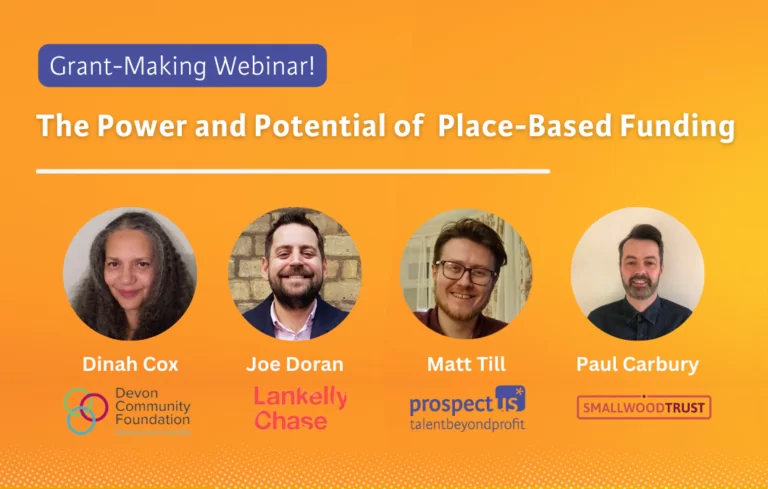How to write an effective Fundraising Job Description
Simply put, a good job description is a well-defined job description. It needs to provide all the information needed for a candidate to make an informed decision to apply.
We’ve put together this comprehensive guide on how to create a fundraising job description where we’ve included all the essential components, along with recommendations from our expert Fundraising Recruitment Team.
The importance of a good fundraising job description
A well-written, effective job description can go a long way. It is the first introduction to the role and the organisation for prospective candidates and first impressions matter! A good job description can make the difference between a candidate applying, or not, so it is important to ensure it’s engaging and explains why they would want to join your organisation in this particular role.
Equity, Diversity and Inclusion (EDI)
EDI should be at the heart of every stage of your recruitment. Every organisation will be at a different stage in their EDI journey, so where better to start diversifying your organisation than in the initial stages of recruitment? What you really want to achieve in the job description is inclusivity and you can do this by showcasing your position on EDI, including a statement from the CEO or Line Manager. If you have any accreditations within EDI, you could include that here too.
It is important to include a realistic reflection of what is needed in the role, and which qualities are desirable but not quite required. Much research points to the fact that certain groups of individuals are less likely to apply when they do not meet every skill that is marked as ‘required’ compared to others, despite being someone the organisation is looking for. For example, according to a Hewlett Packard report, men apply for a job when they meet 60% of the qualifications, whereas women only apply if they meet 100% of them.
Celebrating diversity and actively encouraging it in your fundraising team not only encourages job satisfaction and thus, retention and sustainability, but more and more, candidates are prioritising EDI values in their job search. In fact, two-thirds of UK workers said that the acceptance and inclusion of employees from all backgrounds is important to them when searching for jobs. Staying up to date on ‘best recruitment practises’ can be tricky, as they are constantly evolving as more research is conducted on the needs and requirements of under-represented groups. Do reach out to Prospectus for any support or questions – we will always be happy to help! You may also like to take a look at our guide on offering reasonable adjustments in a recruitment process for some tips.
Key information to include
Job title – A short and simple job title at the beginning of the job description which encompasses the main responsibility of the post.
Salary – This can be a single figure or a range. The salary range listed needs to be a truly appointable range and if you are looking to appoint at the bottom of the salary range, this needs to be clearly stated so candidates are aware from the beginning.
Showing the salary ensures it’s a fair process and prevents pay gaps for disadvantaged groups as hiding the salary and leaving it up to salary negotiation can often lead to discrimination. A recent study found that increased transparency around salary led to a 20% decrease in gender pay gap.
Prospectus provides a thorough and professional salary benchmarking service to help you attract the right talent. Please do reach out if you think this service might be useful for your organisation.
Contract type – Is it a permanent, temporary or contract role? For temporary and contract roles, define how long it is for and it can be useful to mention why it is a short-term role.
Hours – Is the role full-time or part-time? Ensure you specify the full-time hours and if you are open to part-time hours, define the minimum number of hours/days required in the role, along with any flexibility available around hours. For instance – compressed hours, start or finish time etc. Another option to consider could be job sharing or job split.
Location – Clearly define where the role is based and if you are offering hybrid working, define how many days in the office are required. This is still one of the main considerations for candidates when looking for a new job, so it’s important to be very clear about what your organisation’s policies are around office/home working.
Reporting To and Line Reports (if any) – Include the title of the position the role reports to, and if applicable, any line reports. It’s also important to mention what team the postholder will be joining and how the role fits into the wider company, along with other key internal relationships.
Application Process – Detail the application process. We recommend requesting a CV and a tailored supporting statement of up to two pages as a lengthy application form can discourage candidates from applying. Candidates can show their suitability for the role by detailing their experience on their CV and statement and any further questions can be raised in a subsequent phone call or interview.
Dates – Clearly state the deadline for applications and dates for interviews. Specify how many stages and if it will be, remote or in-person. This is beneficial so candidates can plan around both their personal and professional lives which means a higher likelihood of interview attendance.
Benefits – Often we have candidates enquire about employee benefits before they decide to apply for a role. Thus, we recommend including some brief information around annual leave days, pension, parental leave etc. Outlining your benefits is also a good way to make your organisation stand out from the crowd.
Background of the role
Even if simplicity is your thing and you are trying to be brief and to the point in your job description, information on your organisation is key. You are highlighting that you care about the cause and that they should too. A simple four lines will do!
Role purpose – a simple summary that gives narrative about the necessity of this role and its impact on the team.
Context of the role – Where does this role fit into the wider income strategy? What exciting projects will this role be involved in? Is there anything that makes this role stand out from the rest within the sector?
Role responsibilities – include 6-10 of the most common responsibilities in the role and even a breakdown of their frequency is useful for candidates. You could arrange this in order of importance and how much time will be spent doing each task, as an estimate. Keep it concise!
Skills, knowledge and experience
When it comes to the person specification, it is equally important to keep this to the point. We often see examples where the person specification list is exhaustive; and though a level of detail really helps to bring the role to life, too much can become unattractive and, more importantly, deter some groups of people from applying due to systemic inequality and/or lack of confidence.
Questions to ask yourself when drafting the person specification are:
- Are the skills, knowledge and experience you’ve asked for relevant to the responsibilities of the role? By ensuring non-essential and non-inclusive specifications are avoided such as Degree requirement, number of years’ experience or specific sector only experience, etc. you’re able to attract a much more diverse pool of candidates.
- Do they really need a degree or alternative qualification? In most cases this isn’t needed, as transferable skills or lived experience can be just as beneficial.
- Are these skills essential or desirable? You should indicate both. Sometimes splitting these into two different subheadings can be an effective way of doing so and consequently, you’ll be helping to make the recruitment process as inclusive as possible.
- Furthermore, are ‘years of experience’ in previous roles an essential requirement? We advise against using time of experience altogether as this commonly causes indirect discrimination. Alternatively, try thinking about it in terms of the success of fundraising, experience in a specific income stream, targets and overall achievements that can be discussed at interview stage.
At Prospectus, our Fundraising Recruitment Team partner with charities and not-for profit organisations on the full array of income generation roles across the sector. We provide expertise, knowledge and insight into the fundraising recruitment world to help you attract the very best fundraisers!
Whether you or your organisation are thinking about fundraising recruitment this year, we’re always happy to have a confidential chat. Check out our full range of recruitment services and let us know if we can use our recruitment and search expertise to guide you on your recruiting journey.







